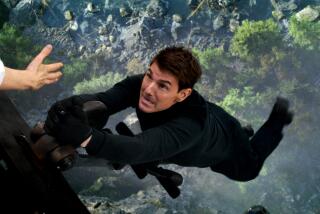U.S. WON’T CUT TV GORE FOR BRITISH
- Share via
Although Britain plans drastic moves to reduce American TV violence from its screens in the wake of a recent mass murder there, those involved in the distribution of Hollywood programs abroad say American producers are unlikely to clean up their scripts to suit Britain’s new tastes.
“The reality is, this is a commercially driven industry, and whatever the (U.S.) networks want is what dictates what gets made,” said Ken Page of Gilson International, the international distributing company for MTM Productions. “They’re in the driver’s seat.”
Maurie Goodman, NBC’s vice president of broadcast standards on the West Coast, said that although screen violence is an ongoing concern at the network, the news of Britain’s reevaluation of the issue has caused no reaction there. “Absolutely none,” Goodman said.
Producers of some of the shows that may be axed in England say they will not change their shows based on the British scare. “I’m not concerned,” said Michael Mann, executive producer of NBC’s “Miami Vice.” “Our content is definitely not going to be affected.”
Said James McAdams, executive producer of “The Equalizer” on CBS: “I really don’t think that we’re guilty of being irresponsible about violence. It’s a violent world. It (public reaction) always seems to be spawned by an incident. If TV is overdoing it, why wait till something happens?”
Britain’s recent decision to cut back on TV violence was spurred by one shocking incident: Michael Ryan gunned down 16 persons Aug. 19 in the English town of Hungerford before turning the gun on himself. Although no connection was established between Ryan’s actions and TV-watching, British television networks decided to crack down on the amount of violence on TV. Prime Minister Margaret Thatcher vowed to use government power to limit such programming.
In Britain, as well as in other countries, much of that violent product comes from Hollywood, which is better able to afford the high-priced special effects and stunt work that go into making action-adventure series.
Britain’s decision will affect what the country’s networks purchase during their annual November pilgrimage to Hollywood.
“The fact of having a major problem here obviously means we look more carefully at violent material,” said Alan Howden, general manager of acquisitions for the British Broadcasting Corp.
Page predicted that the British would buy “softer” American shows this year; Howden confirmed that the BBC has purchased some episodes of Lorimar’s sentimental family series “Our House” for weekend broadcast.
Howden pointed out that the effect will be minimal at the BBC, however: The BBC’s most popular American shows, including “Dallas,” “Dynasty” and “Moonlighting,” are not action shows, anyway.
The BBC has decided not to air several “Miami Vice” episodes that had what Howden called “a particularly sleazy tone,” and it has opted not to purchase “Crime Story,” another NBC series produced by Mann, because of concern over violence.
“There are other places to sell to in England besides the BBC,” Mann said.
England’s Independent Television Assn. is taking more radical action: It has vowed to cut 90 minutes from its weekly 5 1/2 hours of American action programs, with particular concern over shows such as “The Equalizer” and “The A-Team.” David Shaw, director of the ITV Assn., said that the gaps will be filled with British programming, rather than with softer American shows.
Shaw said that American violence would still appear in shows that the British networks consider to be quality dramas, such as “Hill Street Blues.”
“ ‘Hill Street’ is often quite violent but, in a sense, it’s in a perspective; it’s never gratuitous,” he said.
Although those in the U.S. TV industry concede that the British market is not large enough to exert much control over the content of American action shows, that could change if the concern spreads to other countries.
“The present British furor is spreading over the continent; other countries might say, ‘Let’s stop and look at what we’ve been doing,’ ” Page said. “As Europe gets more commercial, it has to buy more American product, and two or three years from now, the market may be different.
“The tail will never wag the dog, but it will at least give it pause.”
More to Read
The biggest entertainment stories
Get our big stories about Hollywood, film, television, music, arts, culture and more right in your inbox as soon as they publish.
You may occasionally receive promotional content from the Los Angeles Times.










